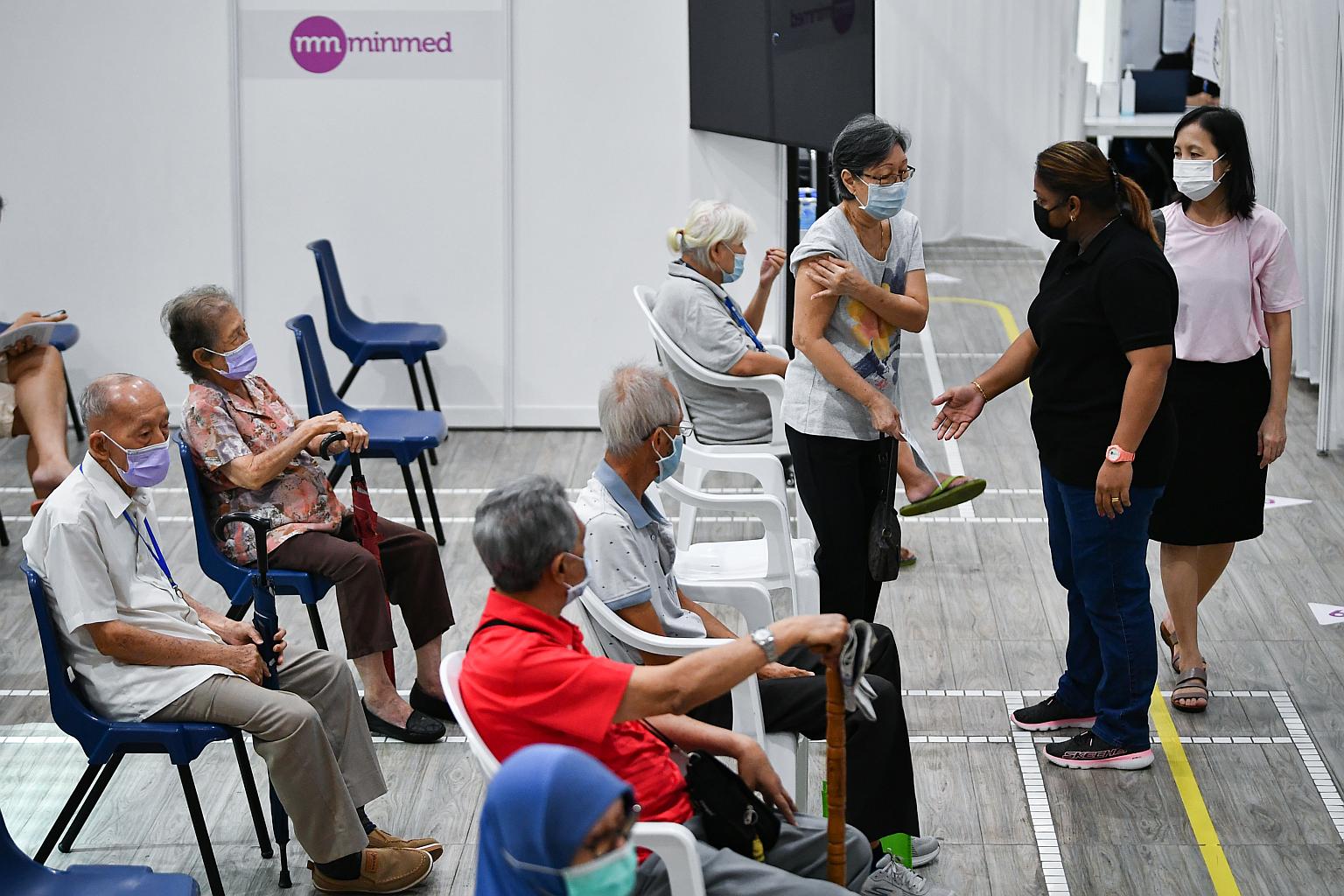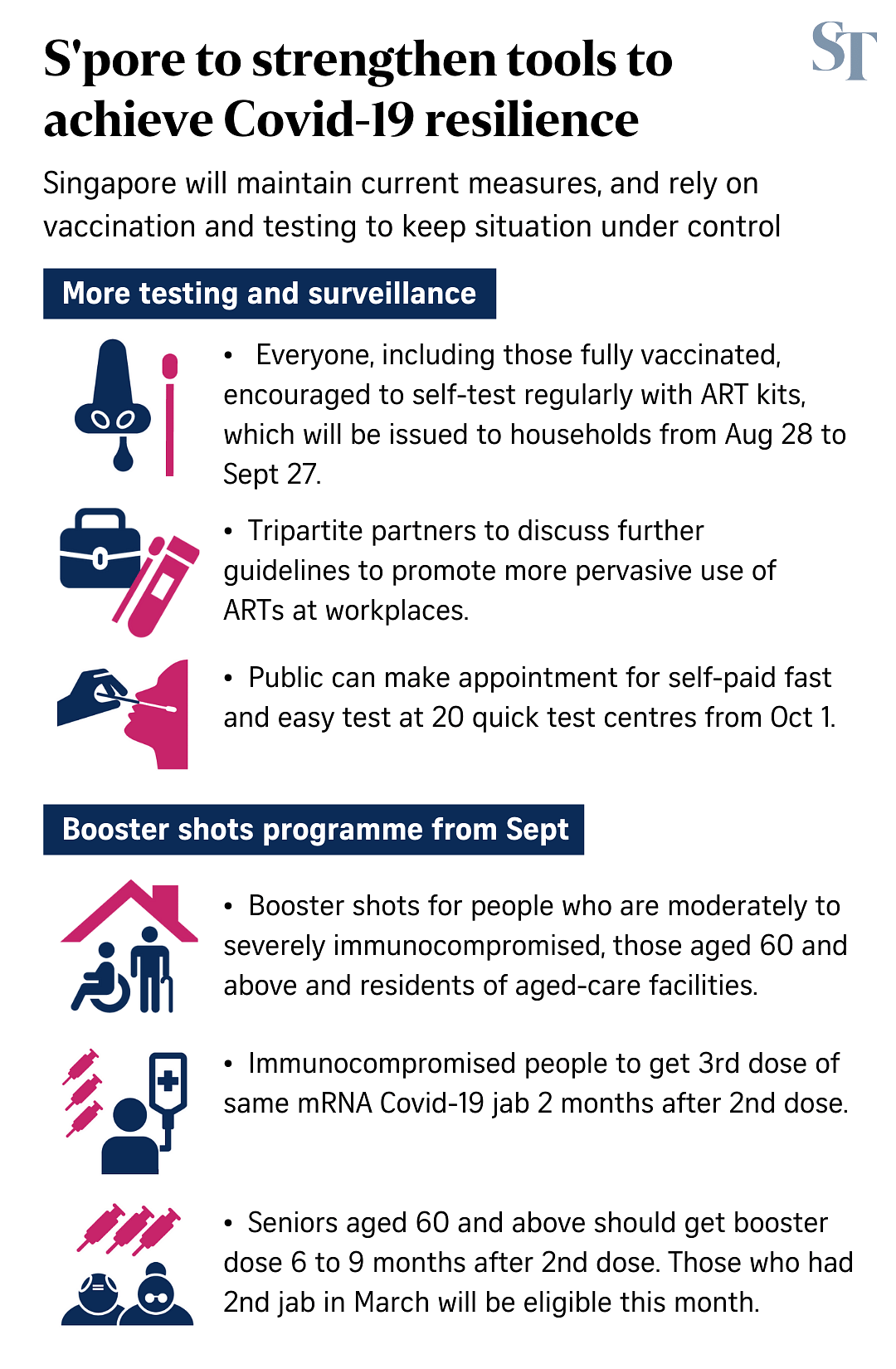Covid-19 vaccine booster shots for seniors aged 60 and above, immunocompromised people from Sept
Sign up now: Get ST's newsletters delivered to your inbox

Seniors should receive a booster dose of mRNA vaccine six to nine months after completing their two-dose vaccination regimen.
ST PHOTO: LIM YAOHUI
SINGAPORE - Singapore will give its first Covid-19 vaccine booster shots - to seniors aged 60 and above, residents of aged-care facilities, and those whose immune systems are compromised - from this month, said Health Minister Ong Ye Kung on Friday (Sept 3).
Seniors should receive a booster dose of mRNA vaccine six to nine months after completing their two-dose vaccination regimen, said his ministry.
This means the first batch of seniors aged 60 and above who completed their original vaccination regimen around March this year will be eligible for their third dose later this month, said the Ministry of Health (MOH).
Those who are moderately to severely immunocompromised should receive a third dose of the same mRNA vaccine two months after their second dose, as this ensures they start off with adequate protective immune response to the virus, added the ministry.
These recommendations were made by the Expert Committee on Covid-19 Vaccination, after it reviewed the available evidence, including on the safety and efficacy of booster doses administered around the world.
MOH has agreed with its recommendations to start the booster shot programme for these groups of people, it said in a statement on Friday.
The booster shots for seniors are to ensure continued high levels of protection against infection and severe disease from Covid-19, and to reduce the possibility of spikes in infection and more people falling severely ill.
Migrant and healthcare workers, if they are 60 and above, will also be prioritised for booster shots.
Seniors are at risk of severe Covid-19 infection and may develop a lower immune response from their two-dose vaccination regimen, it said. "This is coupled with the expected decline of their immunity over time, as many were vaccinated earlier."
Mr Ong noted that with the waning immunity provided by vaccines and increasing breakthrough infections, a number of countries have commenced vaccine booster programmes.
"This is to pre-empt a very sharp rise in breakthrough infections, which can still mean, in absolute terms, many people can fall very sick or die... This is especially relevant to the elderly and to other higher-risk groups," said Mr Ong, who co-chairs the multi-ministry task force tackling Covid-19.
He urged all seniors contacted by their healthcare providers to come forward for their third dose of vaccination.
MOH said that the additional dose recommendations for immunocompromised individuals, seniors aged 60 years and above, and residents of aged-care facilities are aligned to the vaccination measures adopted in countries such as Israel and Germany.
The United States Food and Drug Administration (FDA) has also approved a third dose for immunocompromised individuals and is considering its recommendation for seniors, it added.
Among those who will be at the front of the line for booster shots are immunocompromised people, as they have a blunted immune response to vaccination and are at a higher risk of severe illness from Covid-19.
People with weakened immune systems include those who are on cancer treatment, transplant patients, other patients on immunosuppressive therapy, and end-stage kidney disease patients on dialysis.
These individuals will be contacted by their healthcare providers, as they would likely have regular follow-up sessions with their doctors, said Mr Ong.
During the virtual press conference on Friday, he also said the expert committee will continue to review the evidence and data for other groups.
One area which it is studying is the rare, but more severe, adverse reaction to vaccines which occurs mostly in younger age groups.
Another area is the effectiveness of using a different vaccine as a booster from the vaccine used in the first two doses, he said.
Asked why front-line workers - who were the first group to be vaccinated in Singapore - are not the first to receive the booster shots, director of medical services Kenneth Mak said the expert committee had looked at which groups needed additional protection to mount an adequate immune response to the virus.
For immunocompromised patients, they may not have developed even after the first two doses are completed. "This third dose is considered an expanded primary course of vaccination for them," he said.
As for prioritising those aged 60 and above, Associate Professor Mak said they are more likely to have bad outcomes if they do get infected, such as an increased risk of being admitted to the intensive care unit and needing oxygen support.
While vaccinated migrant workers will also experience waning antibody response, they are generally younger, he noted. But they may also get their booster shots earlier if they are above 60, he added.



